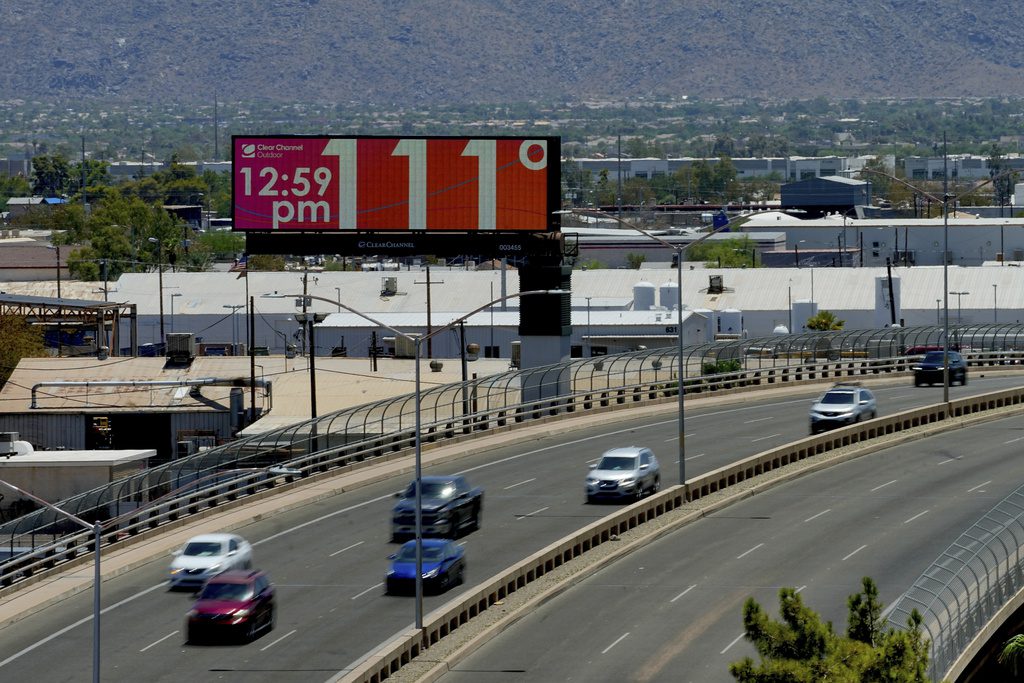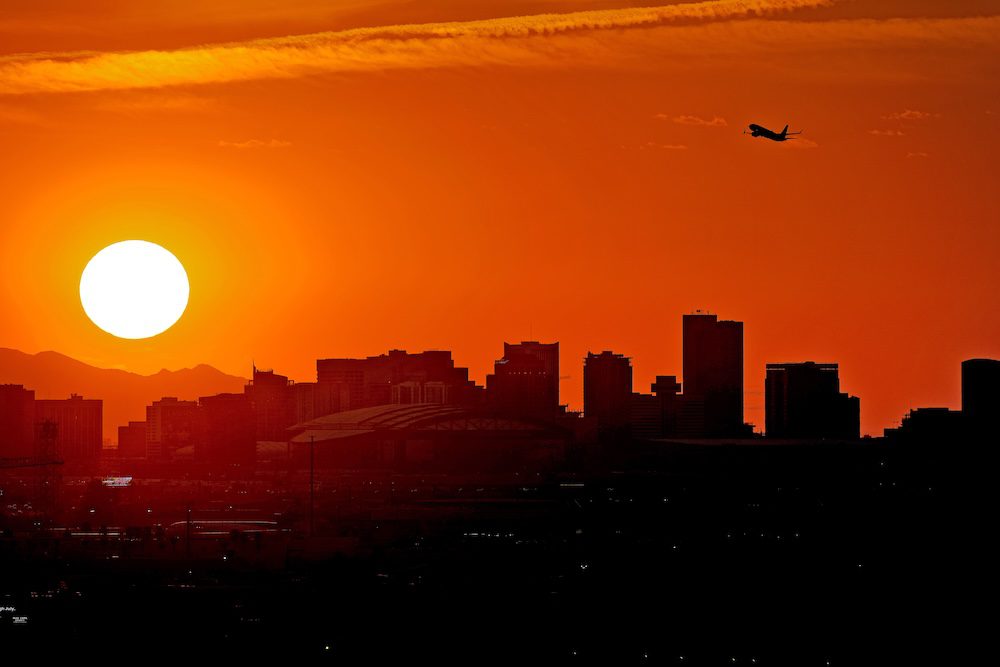
FILE - A digital billboard displays an unofficial temperature, on July 17, 2023, in downtown Phoenix. The death certificates of more than 2,300 people who died in the United States last summer mention the effects of excessive heat, the highest number in 45 years of records, according to an Associated Press analysis of Centers for Disease Control and Prevention data. With May already breaking heat records, 2024 could be even deadlier. (AP Photo/Matt York, File)
Arizona’s ballot this November will be long — really long. Somewhere near the bottom, voters will be asked to choose three candidates to represent them on a state regulatory board called the Arizona Corporation Commission (ACC). Even though it may not be familiar, the ACC has one of the important jobs in the state: overseeing utility companies and holding them accountable to consumers. Its commissioners make decisions every month that affect our daily lives, from how much we pay for electricity to how much pollution is in the air we breathe.
As the executive directors for the nonprofits Our Voice, Our Vote Arizona and Chispa Arizona, we advocate for the interests of Arizona’s Black, Latine, and Indigenous people. Our communities consistently pay more for electricity than our white neighbors. We also suffer disproportionate rates of lung disease, heat-related illness, heart disease, and cancer caused by the burning of fossil fuels.
Climate change is already taking a toll on our health and quality of life — and the wealthy and well-connected work hard to shield themselves from those costs. It’s the perfect moment to highlight why Arizonans should demand new leadership on the ACC.
- Our representatives enable monopolies to put profits over people and raise our electric bills to pay for it.
Arizonans pay the highest summer energy bills of any state in the U.S. The average monthly bill now hovers around $235. For many households, these costs aren’t just an inconvenience, they’re a crisis. Only a fraction of low-income families who qualify for federal cooling assistance actually receive it, and the Salvation Army utility assistance hotline in Phoenix has been so overwhelmed with calls that they regularly run out of money partway through the summer months.
Every rate increase utilities impose on Arizona families must first be approved by a majority of the ACC’s five commissioners. The ACC rarely denies a utility’s rate hike request, even when faced with fierce opposition from consumer advocacy groups. The ACC has allowed monopolistic utilities to realize record profits while hardworking Arizonans pay the price.
- The ACC has allowed utilities to exploit communities of color at the expense of our health and local economies.
Where should we site fossil fuel power plants and refineries? For too long, the answer to this question has been: In historically redlined Black and Latine communities. The ACC is supposed to prevent utilities from exploiting communities, but instead, it often enables them. Just last year, the ACC caved to pressure from the Salt River Project (SRP) and approved the utility’s plan to build a natural gas plant in Randolph, a historically Black community in Pinal County. Pinal is the fastest-growing region for Black people in Arizona outside of Phoenix. In doing so, the ACC ignored years of local opposition from residents concerned about the health and environmental impacts of natural gas turbines within blocks of their homes. The Sierra Club described the SRP expansion as “textbook environmental racism.”
Black Americans are 75% more likely than others to live in fence-line communities adjacent to oil and gas facilities and are exposed to 1.5 times as much air pollution. Gila, Maricopa, Pima, and Pinal counties all have failing grades for air quality from the American Lung Association. The most dangerous consequence of living in proximity to fossil fuel plants is the increased risk of lung diseases (including asthma), heart disease, and cancer. But there’s another hidden consequence — it depresses home values and stifles communities’ ability to build generational wealth.
- Arizonans support the transition to clean energy, but the ACC is helping utilities prolong our reliance on fossil fuels.
Despite the well-known threats that fossil fuels pose to our health and the environment, despite the fact that Phoenix ranks fifth in the nation for having the worst year-round air pollution, and even though most Arizonans support clean energy, four out of five ACC commissioners are clinging to coal and gas as if their livelihoods depended on it — and in years past, maybe they did.
The ACC has made no progress towards clean energy since 2006 — in fact, we’ve gone backward. Those 2006 clean energy regulations? The current ACC made moves to repeal them earlier this year. Some ACC commissioners justify their love affair with fossil fuels with false claims about cost and reliability. In truth, studies show solar energy is cheaper and more reliable than coal or gas. In America’s sunniest state, there are no more excuses. One analyst estimates that Arizona could generate 320 times more energy than its residents consume in a year — enough to become a major energy exporter and generate as much as $2.7 billion a year in new state revenue.
Some of our commissioners on the ACC seem to have forgotten that they are elected officials who are accountable to voters and ratepayers — not to our state’s most powerful monopolies. Together, Black and Latine voters could cast more than a million votes in Arizona this election cycle. This November, let’s remind the ACC commissioners who they work for. Our health, economy, and future depend on it.

Arizona bill ignores climate change, blames poor air quality on other countries
When it comes to HCM 2010, a piece of legislation that attempts to pass the blame for Arizona’s emission pollution levels, the name of the game is...

Why climate activists oppose Arizona Sen. Frank Carroll’s proposal to confront poor air quality
A proposed state law that its sponsor says could improve Arizona’s air quality has met an unlikely foe: climate activists. Senate Bill 1128 would...

Earth records hottest year ever in 2024 and the jump was so big it breached a key threshold
Earth recorded its hottest year ever in 2024, with such a big jump that the planet temporarily passed a major climate threshold, several weather...

Kris Mayes sues ‘nuisance’ corporate mega-farms for exploiting Arizona’s groundwater rules
The state of Arizona filed a lawsuit Wednesday against a corporate farm operating in La Paz County, claiming years of excessive groundwater pumping...





